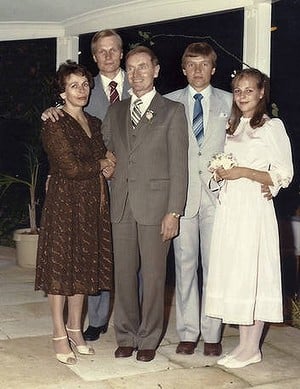
In her Mamamia column today, Shadow Foreign Affairs Minister Tanya Plibersek argues that we need to start talking about death and end-of-life care.
Everyone has a right to die with dignity.
My beautiful father fought cancer bravely, but when it had invaded his bone marrow and his veins were collapsing from the blood transfusions he relied on for white blood cells, he said no to further treatment.
He slipped away quietly, leaving the pain of sickness and the horror of treatment behind.
As a strong advocate for voluntary euthanasia, he didn’t, in the end, reach for the large bottle of morphine he’d been given to manage his pain. It sat at home in the refrigerator, used sparingly, a drop at a time, as he traded off pain for the lucidity he wanted as he said his good-byes.
Like most Australians he wanted to die at home. Like most Australians he ended up dying in hospital. (While 74% say they want to die at home, only about 16% do.)
But he was able to stay home almost to the end, because of great home nursing and wonderful support from the hospice where he was going for treatment.

Top Comments
What about young people and children who suffer and die from cancer?
I watched in horror,my beautiful 17 year old suffer and die in front of me from a Glioblastoma Multiforme,and there was nothing I could do about it.
Fortunately - if you could say that- she went very quickly in the end.
I guess I am a fence sitter,as as much as I didn't want her to die,I also didn't want her to suffer or be in pain.
So what does one do in these circumstances? Would you administer your own 17 year old daughter with lethal drugs to end their pain and their life?
I know that I could not do this.
My father died of pancreatic cancer at age 64 and my sister in law died of breast cancer at age 40. Both died at home with the support of their partners who gave up work for the last months to care for them, a palliative care nursing service that regularly visited and their GP who was trained in palliative care and also visited them at home.
My father got sick first and had always hated hospitals. I lived interstate and contributed to his well-being by organising the palliative care service to visit in the first instance. I think denial is one of the big problems: it is hard to say that someone is dying and we need to prepare for death rather than plan how to fight the disease.
So, in summary, I think it takes a community to help people die with dignity: volunteer and professional carers, psychological support for the families, medical assistance, and support from employers.
Things that aren't useful include: excessive amounts of paperwork (my mum had to prove my dad's illness and death many times and then they wanted her to go back to work within 2 weeks of his death) and fewer pills in prescriptions for people who are likely to change their medication frequently and a lower pharmaceutical benefits threshold for people like my dad who only live a few months (13 weeks) after diagnosis and reach the threshold at the end of their short time rather than over a year. In short, I think the discussion should include the financial aspects of cancer.